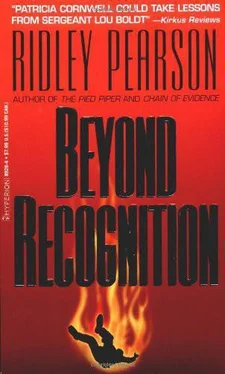Ridley Pearson - Beyond Recognition
Здесь есть возможность читать онлайн «Ridley Pearson - Beyond Recognition» весь текст электронной книги совершенно бесплатно (целиком полную версию без сокращений). В некоторых случаях можно слушать аудио, скачать через торрент в формате fb2 и присутствует краткое содержание. Жанр: Триллер, на английском языке. Описание произведения, (предисловие) а так же отзывы посетителей доступны на портале библиотеки ЛибКат.
- Название:Beyond Recognition
- Автор:
- Жанр:
- Год:неизвестен
- ISBN:нет данных
- Рейтинг книги:5 / 5. Голосов: 1
-
Избранное:Добавить в избранное
- Отзывы:
-
Ваша оценка:
- 100
- 1
- 2
- 3
- 4
- 5
Beyond Recognition: краткое содержание, описание и аннотация
Предлагаем к чтению аннотацию, описание, краткое содержание или предисловие (зависит от того, что написал сам автор книги «Beyond Recognition»). Если вы не нашли необходимую информацию о книге — напишите в комментариях, мы постараемся отыскать её.
Beyond Recognition — читать онлайн бесплатно полную книгу (весь текст) целиком
Ниже представлен текст книги, разбитый по страницам. Система сохранения места последней прочитанной страницы, позволяет с удобством читать онлайн бесплатно книгу «Beyond Recognition», без необходимости каждый раз заново искать на чём Вы остановились. Поставьте закладку, и сможете в любой момент перейти на страницу, на которой закончили чтение.
Интервал:
Закладка:
“It’s a start,” he said, trying to be upbeat.
“Just the point,” she fired back. “A start for us, an end for him. Twelve years old, Lou. Murder. Some kind of exchange at the airport. She was protecting him from us: the courts, the truth. Can you blame her?” She sucked down a good deal of beer.
“I’ll drive you and take a cab back. I insist.”
“Then I’ll take another,” she said, holding up the empty can.
The beers were on ice in the ice bucket.
“First class service,” Boldt said nervously, delivering the beer.
“I won’t bite,” she said, popping the top.
But Boldt wasn’t so sure. He wasn’t sure of anything anymore. The cellular phone rang for a second time. Boldt didn’t even bother going for his, but when Daphne answered hers and shook her head, the sergeant thought better and lunged across the small room.
“Boldt!” he answered curtly. Cupping the phone, he told her, “LaMoia.” He grunted into the receiver several times, impatient for his detective to get to the point. He was talking excitedly about scanners and hits and making a big point about his personal contacts in the banking industry.
Boldt listened intently as LaMoia finally got to the point. Boldt disconnected the call with a heart in his chest that couldn’t find the beat.
“Good God!” she said, seeing his reaction. “What was that?”
Boldt took a deep breath, exhaled, and closed his eyes. When he opened them he said, “He got back the information on the ladders, the credit card accounts, and the bank accounts-the names, the mailing addresses …” She knew better than to interrupt. Boldt met her eyes and said, “Steven Garman bought one of the Werner ladders two years ago at a hardware store up on Eighty-fifth.” He took a breath. “The thing to do now is see if he still has it.”
Boldt did not drive Daphne home. Having interviewed Garman in the first place, she insisted on tagging along. During the hurried drive to a neighborhood twenty blocks north of Boldt’s house, she spared no opportunity of reminding Boldt of that initial assessment of hers.
“One doesn’t make arrests based on opinion,” he replied, following her third reminder.
“It’s the beer talking, not me,” she apologized.
“Well, please ask the beer to be quiet when we get there,” he snapped testily. “This is an inquiry, nothing more.”
But the beer spoke again. “Bullshit, and you know it. If that ladder’s there, its pads match. But it won’t be. He knows all about that evidence.”
“Which leads one to ask,” Boldt countered, “why, if he knew about the impressions found at Enwright, did he use the same ladder at my house?”
The words flew around the inside of the car like trapped birds. Boldt ducked from them, shrinking from the logic of his own statement. Why indeed?
“You’re not going there just to chat him up, and we both know it. Why did you ask for a patrol backup? I’ll tell you why: Because you intend to cuff him and bring him downtown for the Box. That’s why you need me along.” She grabbed for the dash as Boldt pulled sharply off the road. “What are you doing?”
“I never thought I’d be glad about an espresso shop on every corner.” She looked blank. He told her, “You’re right. We had better get you a cup of strong coffee.”
Despite her protests, at Garman’s Daphne remained in the car. Boldt and LaMoia, who arrived only two minutes behind, approached the front door. The patrol car and its solo uniformed officer idled at the curb.
Garman wore reading glasses, a cotton sweater, and blue jeans. His pager was clipped to his belt. “Gentlemen,” he said, not a trace of concern or anguish in his voice.
There were times when Boldt liked to skirt the issue, make small talk, or bring up a subject completely away from his central point, establish a rapport, and ease his way into it, but he had a working relationship with Garman, and that evening he went straight for the jugular. “You bought a twenty-four-foot extension ladder manufactured by Werner Ladders from Delliser Brothers up on Eighty-fifth.”
“Summer before last,” Garman informed him, nodding. “You boys are thorough. I’ll say that. You might have asked. I could have saved you the trouble.”
Boldt and LaMoia engaged in a quick eye check, both surprised by Garman’s forthcoming nature.
“We’d like to see that ladder,” LaMoia told the fire inspector. The detective had called in a telephone search warrant that had been authorized by Judge Fitz. He informed Garman of this, hoping he might ruffle the man.
“You’re welcome to come inside,” Garman offered, opening his door wide. “You don’t need a flipping warrant.” The two detectives stepped in. Boldt heard a car door shut. He didn’t need to look to know it was Daphne. “But you won’t find a Werner ladder,” Garman added, without a hint of remorse. “I replaced it with a different brand, one of those aluminum numbers that hinges in a couple of places. You know the kind?”
“Replaced it?” Boldt asked.
“It was stolen,” Garman informed them. “Six, maybe seven months ago.” He nodded, his lips pursed. “Swear to God.” Daphne knocked. Garman admitted her. They shook hands. “Listen,” Garman said, “you want to do this downtown, or can we do it here?”
Boldt felt out of sync, the fireman anticipating his every move, his every question. He wanted to take him downtown, use the Box, intimidate the man. Work a team interrogation, LaMoia the bad guy, Boldt the friend, Daphne the outsider. Loosen him up at the edges. Trip him up. But he wondered all of a sudden if it would work with a man accustomed to conducting his own investigations, his own interrogations. It felt a little bit like looking at himself in the mirror.
“Here will do,” Boldt said, wanting to give the man nothing, wanting an explanation for the two dead women and the threat on his own family, but torn by the necessity of an assumption of innocence. Cops didn’t work from such an assumption, they left it to the judges and juries. Boldt saw the man as a killer-clever, perhaps, professional, but a killer nonetheless. He owed him nothing.
“I’ll look around,” LaMoia said, directing one of his patented expressions of loathing toward the suspect. LaMoia was a cop who cut to the chase, rarely, if ever, electing subtleties. His method was more head-butting, beating a suspect down into submission. He produced a flattened Dunkin’ Donuts bag with a bunch of writing on it. He said, “Just to make it official. This is the warrant the judge signed off on.”
The bag was oil-stained, the writing illegible. Garman accepted it, looked it over, nodded, and handed it back. “Very official,” he said, trying for a joke.
LaMoia recited the Miranda. Garman just smiled, miming the words along with him.
Boldt wanted to pop the guy. Garman was too smug, too prepared-or innocent as the day he was born. Boldt knew before they started that they weren’t going anywhere with this one. Daphne asked for a cup of coffee. Garman made her a cup of instant; made one for himself as well. Boldt and Daphne sat on a couch that had seen better days. Garman took the La-Z-Boy recliner upholstered in a maroon Naugahyde.
Fifteen minutes into the questioning, Boldt taking furious notes and double-checking Garman’s exact language, LaMoia joined them. He shook his head at Boldt from behind Garman and held both hands into a large zero. Boldt was hardly surprised.
They talked in circles for the better part of the next hour, returning to some of Garman’s statements and attempting to catch him in a misspeak, but the Marshal Five’s performance-if that’s what it was-seemed utterly convincing. Here, Boldt realized, was a man who had achieved an honored position among firemen. He had served his city well, earning several merits of distinction for both his professional life and his volunteer work with teens. Put him in front of a jury with all the damning evidence in the world, and you might not win a conviction.
Читать дальшеИнтервал:
Закладка:
Похожие книги на «Beyond Recognition»
Представляем Вашему вниманию похожие книги на «Beyond Recognition» списком для выбора. Мы отобрали схожую по названию и смыслу литературу в надежде предоставить читателям больше вариантов отыскать новые, интересные, ещё непрочитанные произведения.
Обсуждение, отзывы о книге «Beyond Recognition» и просто собственные мнения читателей. Оставьте ваши комментарии, напишите, что Вы думаете о произведении, его смысле или главных героях. Укажите что конкретно понравилось, а что нет, и почему Вы так считаете.












